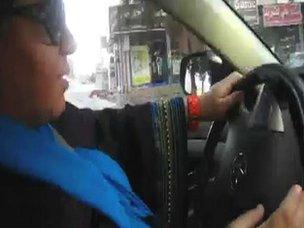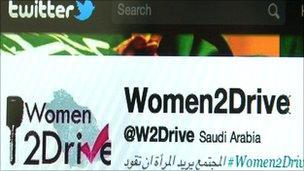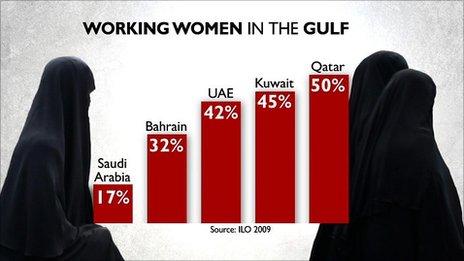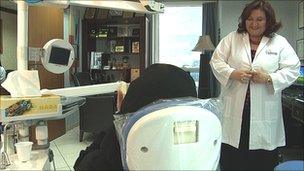Saudi women turn to social media for the right to drive
- Published
WATCH: Saudi Arabia's women are forced to rely on men to do the driving - which puts many jobs off-limits, and makes running a business almost impossible
The video shows a young woman getting into her car for a spin around town with a friend. Giggling away, they sound excited yet nervous. And all the while, they comment on the reactions of passers-by.
So far, the story sounds uneventful. After all, millions of women across the world drive every day without a second thought.
Only the difference is, this video was shot by 28-year old Solafa from Saudi Arabia, the only country in the world that bans women from driving.
Driving change
On June 17, dozens of videos similar to Solafa's surfaced on the internet, all showing women behind the wheel in defiance of a ban that is not enforced by law but is a religious fatwa imposed by Muslim clerics.
It was a protest of a different kind - unlike the mass demonstrations that have been seen throughout the region this year, this was a campaign of just 50 women.
But one thing it has in common with the Arab protests is the role social media played.
Through Twitter and Facebook, the 'Women2Drive' campaign gave women a voice for other people to hear. US Secretary of State Hillary Clinton openly supported their cause. Even some of the Saudi royals have backed what the women are doing.

Solafa Kurdi uploaded a video of herself driving in Saudi Arabia to YouTube.com
Solafa and her friends joined the campaign to prove a point.
"Being a photographer needs me to be in different places and at different times," says Solafa. "I have to pay around $500 every month just for a driver, when I could do what he's doing myself."
Although Solafa says she can afford that extra cost, it is more of a burden for families where women are paid lower salaries.
"The minimum wage for a Saudi worker is around 3,000 riyals ($800; £500)," Solafa says. "If you're going to put half of that on a driver, there goes half of your salary, it's almost like paying taxes."
Status update
The likes of Twitter, Facebook and Youtube have enabled the women to challenge the status quo more easily.
A recent report published by the Dubai School of Government examined the role social media has played in the Arab uprising. It found that the percentage of women who used Facebook rose from 32% to 33.5% in the first three months of this year.
A small percentage increase maybe, especially when you consider that on average, women globally constitute 61% of Facebook users. Nevertheless, while the percentage of women users in the Arab world creeps up, the proportion of male Facebook users in the region is falling.

The social media campaign gained a huge international following
Looking at the effect of social media on the region's economy is still in its infancy, according to Fadi Salem, Director of Governance and Innovation at the Dubai School of Government and the co-author of the report. Nevertheless, it does have potential.
"If compared to the emergence of the internet over the last decade and how it contributed to economic development, there are many indicators suggesting that this could be the case as well for social media," says Salem.
"In theory it has this personal characteristic, it has the anonymity, if that's a barrier for some women to participate or start businesses or join a political discussion."
And taking part is crucial for the Gulf's biggest economy.
Working women
More than half of Saudi's university graduates are women.
Last month saw the opening of the world's largest women-only university in Riyadh. But when it comes to the world of work, it is a different story.
According to the International Labour Organisation, in 2009 just 17% of women of working age were in employment in Saudi Arabia. That compares with neighbouring United Arab Emirates where 42% of women work and Qatar, where half the women work.

The proportion of working Saudi women is very low compared to other Gulf countries
Mohammad Al-Qahtani is the head of Saudi Arabia's Civil and Political Rights Association.
He accompanied his wife in the passenger seat on June 17 and says he will make sure his 13-year-old daughter learns to drive too.
"Women's driving is part of it but it's not the whole thing. You have other social restrictions, religious restrictions for women not to work in certain professions," Mohammad says.
"You add all these together and you get this bleak picture of 17% participation, which is one of the lowest in the world."
Even without the full participation of women in the labour market, Saudi Arabia has huge unemployment problems.
One in three people under the age of 25 is jobless in Saudi Arabia. Foreign workers - and that includes the thousands of drivers working for Saudi women - outnumber the Saudi nationals working in the Kingdom.
So what is the solution?
"We should accommodate small and medium sized enterprises, we should create more jobs in the private sectors," says Mohammad.
"If you ask any typical Saudi female businesswoman you get this sense of resentment that she's forced out of her business. She has to hire a male guardian to take care of her business.
"All these restrictions tend to force women to quit their business altogether. It's a big loss not only for them but the economy as a whole."
International assignment
And so many women in Saudi choose to work abroad.
Dr Hibah Shata is a Saudi dentist who has lived in the United Arab Emirates for 10 years.
Business is easier for her in Dubai. The system is set up to encourage women, she says. Nevertheless, she thinks the culture in the region, that emphasises the protection of women, can hold them back.

Dr Hibah Shata has worked in the UAE for 10 years. She says it's much easier to do business there as a woman.
"The woman is with her father and her brother, then her husband and her children, so there is somebody to take care of her all the time, and that's the shelter that the woman has had for so long," Dr Shata says.
"I think that's one of the challenges that women who are trying to be in business and be equal to men face, because men don't take them as seriously.
"They don't see them very independent as they grow up."
Social media seems to be changing that.
Twitter and Facebook accounts are giving more women a voice outside their own home. But they still face opposition from some quarters in giving women the same rights as men.
Turning online campaigns into meaningful political and economic participation is still a way off.